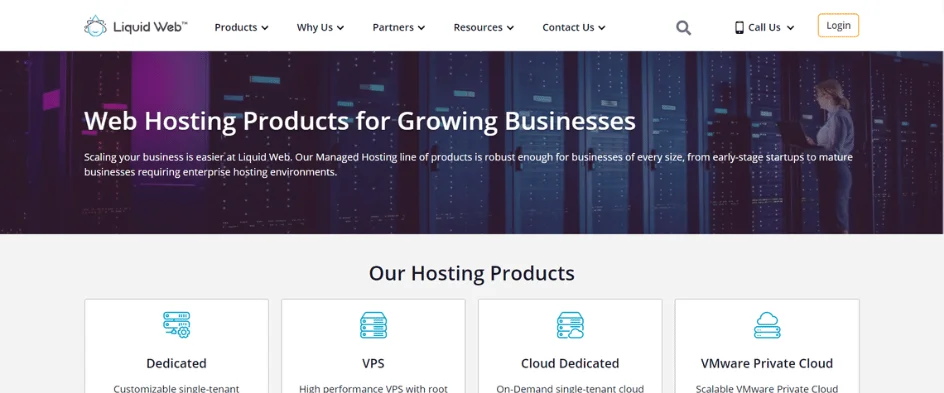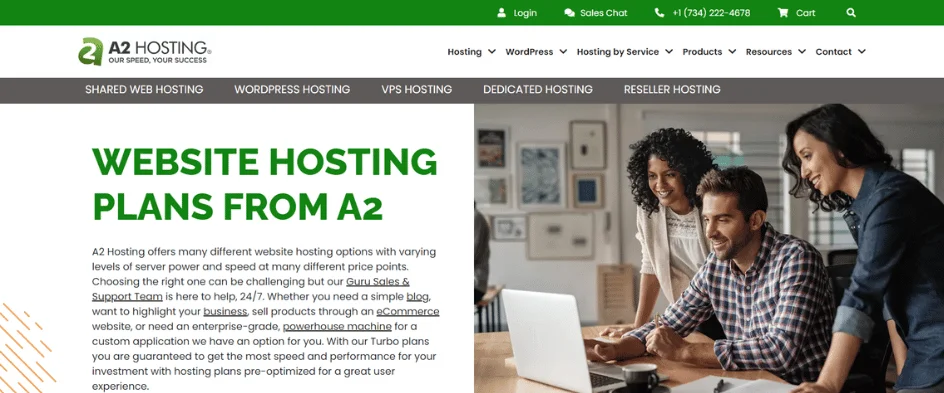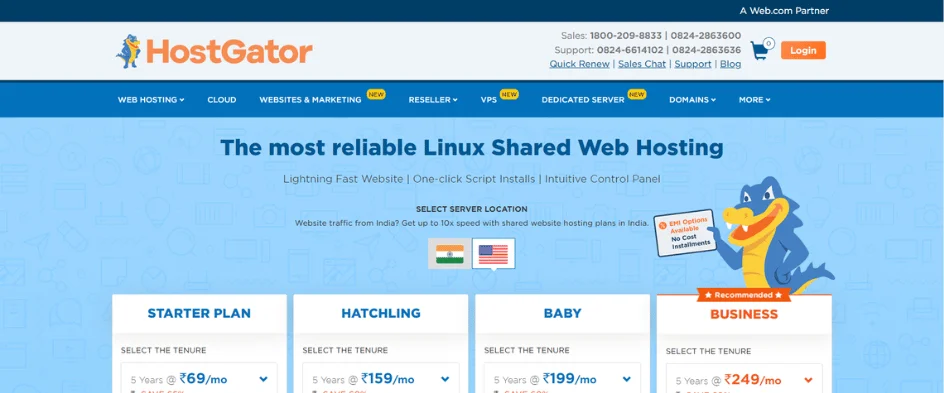Table of Contents
What is Web Hosting?
Web hosting is a service that enables individuals and organizations to make their websites accessible on the Internet. A web host, or web hosting service provider, supplies the technologies and services required for the website or webpage to be viewed online.
Websites are hosted, or stored, on special computers called servers. These servers are maintained and run by hosting providers.
When Internet users want to view your website, they simply type your website address or domain into their browser. Their computer will connect to the server where your website is hosted, and your web pages will be delivered to them through the browser.
In essence, web hosting involves renting or purchasing space to accommodate a website on the World Wide Web. Website content such as HTML, CSS, and images must be hosted on a server to be viewable online.
Different Types of Web Hosting
Web hosting varies widely to meet different needs. Options include shared hosting, ideal for small websites; VPS and dedicated hosting for more control and power; and cloud hosting for scalability. Colocation also exists for those who own their hardware but want the benefits of a professional data center.
(1) Shared Hosting
Shared hosting is like renting a small space on a server with other websites. It’s the most affordable and suitable for small websites or blogs. You share resources like CPU, memory, and disk space with others.
(2) VPS Hosting
VPS (Virtual Private Server) hosting splits a server into virtual servers. Each website on a VPS has its own space but shares the physical server with other users. It’s a middle ground between shared and dedicated hosting.
(3) Dedicated Hosting
Dedicated hosting gives you a server just for your website. It’s powerful and gives you full control over the server environment. Dedicated hosting is ideal for large businesses or high-traffic websites.
(4) Cloud Hosting
Cloud hosting spreads your site across multiple servers in different locations. It’s very scalable, which means your site can grow without running into server limitations. Great for businesses that expect varying traffic levels.
(5) Managed Hosting
Managed hosting means all the technical aspects of running a server are handled by the host. This includes security, maintenance, updates, and more. It’s convenient for those who don’t want to deal with server management tasks.
(6) Colocation
Colocation lets you place your own server in a data center. You rent space, power, cooling, and physical security while managing the server software yourself. Suitable for those who need full control over their hardware but don’t have the space or resources to host a server.
Comparison Table of Web Hosting Providers
| Provider | Type of Hosting | Key Features | Price Range | Best For |
|---|---|---|---|---|
| GreenGeeks | Shared, VPS, Reseller | Eco-friendly hosting, scalable resources, 24/7 support | $2.95 – $109.95/mo | Eco-conscious developers |
| Liquid Web | VPS, Dedicated, Cloud, Managed WordPress | Fully managed hosting, high performance, root access | Starts at $20/mo | High-traffic sites, enterprise needs |
| Digital Ocean | Cloud | SSD-based cloud servers, scalable, developer-friendly APIs | Starts at $4/mo | Developers needing flexibility, startups |
| Hostinger | Shared, Cloud, VPS | Affordable, user-friendly, good performance | Starts at$2.99/mo | Beginners, small projects |
| A2 Hosting | Shared, VPS, Dedicated, Reseller | Fast servers, developer-friendly tools, reliable uptime | Starts at$2.99/mo | All levels of developers |
| SiteGround | Shared, Cloud, Managed WordPress, Woocommerce | Managed services, high uptime, integrated CDN | $2.99 – $100/mo | WordPress users, growing businesses |
| Inmotion Hosting | Shared, VPS, Dedicated | Free domain, secure servers, 90-day money back guarantee | $2.99/mo | Businesses of all sizes |
| Kinsta | Managed WordPress | Google Cloud Platform, daily backups, top security | Starts at $7/mo | WordPress developers |
| WPEngine | Managed WordPress | Genesis framework, robust security, expert support | $20/mo | WordPress developers, large agencies |
| Hostgator | Shared, Cloud, VPS | Reliable Uptime, User-Friendly Control Panel, Free Website Builder | Starts at $3.75/mo | Small Businesses, Blogs, Websites with Low to Medium Traffic |
Top Web Hosting Services Provider For Developers
Top web hosting services for developers offer robust customization options and powerful tools tailored to meet the specific needs of coding and application development. These providers ensure optimal performance and scalability, essential for development environments. Let’s explore these top providers in detail.
(1) GreenGeeks

GreenGeeks stands out for its eco-friendly web hosting, promising 300% renewable energy match on all the energy they consume. They offer a range of hosting solutions from shared to reseller, with an emphasis on sustainability. Their platform is designed for speed and scalability, making it a strong candidate for both new and experienced website owners.
Pros of GreenGeeks
- Eco-Friendly: One of the most significant advantages of using GreenGeeks is their commitment to the environment. They buy three times the wind energy credits to offset the energy used by their servers.
- Performance: GreenGeeks provides SSD storage, optimized LiteSpeed servers, and PowerCacher caching technology, which altogether ensures fast loading times for websites.
- Security: They offer real-time security scanning, automatic brute force detection, SSL secure server, and nightly data backup.
- Support: 24/7 support via live chat, phone, and email, ensuring help is always available.
Cons of GreenGeeks
- Price Structure: While starting prices are competitive, renewal rates can be quite high compared to the initial cost.
- Setup Fee for Monthly Billing: If you choose a monthly billing cycle, there’s a setup fee, which isn’t there for longer-term plans.
(2) Liquid Web

Liquid Web specializes in managed hosting services with a focus on web professionals. They offer a wide range of hosting options including VPS, dedicated, cloud, and managed WordPress hosting. Known for its robust support and high performance, Liquid Web is targeted towards businesses and professional users who need reliable and powerful hosting solutions.
Pros of Liquid Web
- Fully Managed Services: Liquid Web shines with its fully managed hosting, meaning all technical aspects are handled by their experts, from setup to maintenance, security, and updates.
- High Performance: With dedicated resources and advanced technologies, their hosting solutions are optimized for speed and reliability.
- Exceptional Customer Support: Known as “Heroic Support”, their customer service is available 24/7/365, with an impressive response time guarantee. Support is provided by highly trained professionals.
- Versatility: They cater to a wide range of needs with specialized hosting solutions for various CMSs and applications, including WooCommerce and WordPress.
Cons of Liquid Web
- Price Point: Liquid Web’s services are generally more expensive than many competitors, which might not be suitable for those on a tight budget or with minimal hosting needs.
- No Shared Hosting: Unlike many other providers, Liquid Web does not offer shared hosting, which is typically a go-to option for smaller sites or those just starting out.
(3) Digital Ocean

Digital Ocean provides cloud infrastructure primarily aimed at developers, startups, and SMBs. It’s known for its simplicity, high scalability, and developer-friendly features. They offer cloud services that make launching and scaling applications more straightforward and efficient, including droplets (virtual machines), managed databases, and container orchestration.
Pros of Digital Ocean
- Developer-Focused Features: Digital Ocean is designed with developers in mind, offering straightforward tools and robust APIs to deploy, manage, and scale applications with ease.
- Scalability: Scaling resources up or down is easy with their flexible droplet plans and additional products like load balancers and floating IPs.
- Transparent Pricing: They offer straightforward and predictable pricing without hidden fees. This clarity is appreciated by startups and developers planning their budgets.
- Extensive Documentation and Community: Digital Ocean provides a wealth of tutorials and resources, which are highly useful for developers. Their community forums are also a great place to get support and share knowledge.
Cons of Digital Ocean
- Limited Geographic Reach: While they are expanding, their data center locations are not as widespread as some larger cloud providers, which could affect latency for some users.
- No Managed Services: Unlike some competitors, Digital Ocean primarily offers self-managed servers, which might not appeal to those who need extensive technical support or managed services.
(4) Hostinger

Hostinger is widely recognized for its extremely affordable hosting solutions, making it an excellent choice for individuals and small businesses looking for a budget-friendly option. They offer a variety of hosting types including shared, VPS, and cloud hosting.
Pros of Hostinger
- Affordability: Hostinger offers some of the lowest prices in the web hosting market, particularly appealing to those just starting out or operating on a tight budget.
- User-Friendly Interface: Their custom control panel, hPanel, is intuitive and easy to navigate, which is great for beginners who might find traditional panels overwhelming.
- Good Performance: Despite the low cost, Hostinger doesn’t compromise much on performance. They use LiteSpeed Web Server, which provides fast loading times and stable performance.
- Global Data Centers: With servers located around the world, you can choose a data center closest to your audience for improved website speed.
Cons of Hostinger
- Resource Limitations: The cheapest plans come with significant restrictions on bandwidth and storage, which might require upgrades as your site grows.
- Upselling: Some users have reported aggressive upselling tactics during the checkout and setup processes.
(5) A2 Hosting

A2 Hosting is known for its focus on speed and reliability, offering a wide range of hosting options including shared, VPS, dedicated, and reseller hosting. They are particularly praised for their turbo servers that promise up to 20x faster page loads compared to standard hosting.
Pros of A2 Hosting
- Speed and Performance: A2 Hosting provides SSDs, a choice of server location, and optimized software configurations, which significantly enhance website performance.
- Developer-Friendly: They support a wide range of programming languages and technologies, making it a versatile choice for developers.
- Green Hosting: A2 Hosting is committed to being environmentally friendly, using green energy credits to offset its carbon output.
- Anytime Money-Back Guarantee: Unlike many other hosts that offer a 30-day money-back guarantee, A2 Hosting provides a prorated refund at any time if you decide to cancel.
Cons of A2 Hosting
- Price Point: While they offer superior performance, their pricing is relatively higher, especially for turbo plans that provide the fastest speeds.
- Complexity for Beginners: The plethora of options and settings might overwhelm novice users.
(6) SiteGround

SiteGround is highly regarded for its managed hosting services, especially in the WordPress community. It offers shared hosting, cloud hosting, and enterprise solutions, focusing on reliability and customer service.
Pros of SiteGround
- Managed WordPress Services: SiteGround excels with its managed WordPress services, providing automated updates, enhanced security, and powerful caching.
- High Uptime and Reliability: They promise 99.99% uptime, backed by reliable technology and proactive server monitoring.
- Customer Support: Known for exceptional support, SiteGround offers 24/7 help via phone, chat, or ticket, with quick response times and knowledgeable staff.
- User-Friendly Tools: They provide a custom control panel that is intuitive and easy to use, making it ideal for beginners.
Cons of SiteGround
- Higher Renewal Rates: While initial pricing is competitive, renewal rates can be significantly higher, which might be a turnoff for some users.
- Storage Limitations: Their plans come with storage limitations, which might not be suitable for sites with a lot of media content or high storage needs.
(7) InMotion Hosting

InMotion Hosting offers a wide range of hosting services, including shared, VPS, dedicated, and WordPress hosting. They are known for reliable hosting with excellent customer service and business-oriented solutions.
Pros of InMotion Hosting
- Wide Range of Options: From basic shared hosting to powerful dedicated servers, InMotion covers a broad spectrum of hosting needs.
- Excellent Support: Their U.S.-based support team is available 24/7 and is highly rated for both responsiveness and expertise.
- 90-Day Money-Back Guarantee: One of the longest in the industry, giving customers ample time to evaluate their services.
- Free Site Migration: InMotion offers a free site migration service, which is a plus for those looking to switch from another host without hassle.
Cons of InMotion Hosting
- Pricing: Their pricing is generally higher than some competitors, particularly on entry-level plans.
- Speed Variability: While generally reliable, speeds can be inconsistent compared to other top hosts, especially on shared plans.
(8) Kinsta

Kinsta is a premium managed WordPress hosting provider that uses Google Cloud Platform to ensure high performance and security. It is particularly popular among businesses and high-traffic websites.
Pros of Kinsta
- Powered by Google Cloud: Kinsta uses Google Cloud’s infrastructure, offering cutting-edge technology and a fast network.
- WordPress Optimization: They offer specific optimizations for WordPress, including automatic scaling, security, and updates.
- Expert Support: Kinsta’s support team is staffed by WordPress experts who are available 24/7.
- Daily Backups and Security: They provide automatic daily backups and active security monitoring to keep sites safe.
Cons of Kinsta
- Pricing: Kinsta is more expensive than many other hosts, reflecting its premium services.
- Limited to WordPress: They only provide hosting for WordPress sites, which is not suitable for users with other CMS needs.
(9) WPEngine

WPEngine specializes in managed WordPress hosting, delivering a comprehensive array of services tailored specifically for WordPress users. This focus makes it ideal for businesses, agencies, and individuals who want a robust, secure, and high-performance WordPress environment.
Pros of WPEngine
- WordPress Specific Features: WPEngine offers features specifically designed to optimize WordPress performance, including caching technology, a staging environment, and easy-to-manage updates.
- Security: They provide strong security measures including daily malware scans, firewalls, and free SSL certificates to keep sites secure.
- Expert Support: Their support team consists of WordPress experts available 24/7 to help solve any issues specific to WordPress.
- Scalability: WPEngine is built to scale, offering plans that accommodate everything from small blogs to large enterprise websites.
Cons of WPEngine
- Price: WPEngine is more expensive than typical shared hosting services, reflecting its premium features and managed support.
- Limitations on Plugins: Due to security and performance optimizations, WPEngine restricts the use of certain WordPress plugins that might conflict with their setup.
(10) HostGator

HostGator’s hosting solution is the perfect platform for bringing your personal, organizational, or project websites to life. Ideal for developers seeking to display their portfolios or effortlessly host websites linked to their GitHub projects. HostGator empowers you to showcase your work with ease and professionalism.
Pros of HostGator
- Budget-Friendly: HostGator offers some of the most affordable web hosting plans on the market, making it a great choice for those just starting out or on a tight budget.
- User-Friendly: Their control panel and website builder are known for being intuitive and easy to use, even for beginners with no prior technical experience.
- Scalability: HostGator offers a variety of hosting plans, from shared hosting to dedicated servers, allowing you to easily upgrade your plan as your website grows.
- Reliable Performance: HostGator boasts a 99.9% uptime guarantee and offers unmetered bandwidth, ensuring your website stays online and accessible to visitors.
Cons of HostGator
- Potentially Slower Speeds: While speeds are generally decent, HostGator may not be the absolute fastest web host on the market, especially compared to some higher-priced options. This might be a concern for websites with very high traffic or those requiring lightning-fast loading times.
- Limited Backups: Their basic plans don’t include automatic backups, which are crucial for disaster recovery. Backups are often an additional cost.
How to Choose Right Web Development Hosting?
Choosing the right web development hosting involves a few key steps as mentioned below:
1. Assess Your Needs:
- Type of website (e.g., eCommerce, blog)
- Expected traffic volume
- Technical requirements (e.g., databases, programming languages)
2. Choose the Right Type of Hosting:
- Shared Hosting: Cost-effective, for smaller sites.
- VPS Hosting: More control, for growing sites.
- Dedicated Hosting: Maximum resources, for high-traffic sites.
- Cloud Hosting: Scalable, pay-as-you-grow, for fluctuating traffic.
- Managed Hosting: Hassle-free, all technical maintenance is handled by the host.
3. Key Features to Consider:
- Uptime: Look for 99.9% or higher.
- Speed: Check for SSDs and data center locations.
- Security: Essential features include SSL, backups, and firewalls.
- Support: 24/7 availability via multiple channels.
4. Set a Budget:
- Consider both initial and long-term costs.
- Watch out for hidden fees.
5. Read Reviews:
- Get insights from other users about their experiences.
6. Trial Periods:
- Use trial offers to test the hosting service before committing.
This streamlined approach will help you select a web hosting service that best fits your site’s needs and your operational style.
FAQs on Best Web Hosting for Developers
1. Is free web hosting for developers available?
Yes, free web hosting is available for developers, but it often comes with limitations such as reduced bandwidth, storage, and no domain hosting. Examples include GitHub Pages for static sites and certain educational offers from cloud providers.
2. What are the most important things when choosing web hosting for developers?
Key factors include uptime reliability, scalability options, server speed, security features, type of hosting based on project needs, and customer support availability.
3. What is web hosting for developers?
Web hosting for developers refers to a service that provides the technologies and resources necessary for the development, testing, and deployment of websites or applications.
4. What are the 3 types of web hosting?
The three main types of web hosting are:
(1) Shared Hosting: Multiple sites hosted on one server; best for small to medium sites.
(2) VPS Hosting: Virtual private server offering more control and dedicated resources.
(3) Dedicated Hosting: A server dedicated entirely to one client for maximum control and resources.
5. Why do web developers need web hosting servers?
Web developers need hosting servers to publish their sites or apps online, allowing them to be accessible to users worldwide. It also provides the infrastructure for managing, deploying, and scaling applications.
6. What is the difference between a web server and a Web host?
A web server is software (and often the hardware) that uses HTTP and other protocols to respond to client requests made over the World Wide Web. A web host, or hosting service provider, offers the services and technologies that allow you to store your website’s data and files on a web server.
7. Is Shared Hosting Suitable for Developers?
Shared hosting can be suitable for developers with small projects, low traffic, or those just starting out. However, it may not be ideal for high-traffic sites or resource-intensive applications.
8. What security features should I look for in a hosting service?
Look for SSL certificates, secure FTP, regular backups, malware scanning, firewalls, and DDoS protection. These features help protect your site from various security threats.
9. What exactly is web hosting? What does it do for a website?
Web hosting is a service that allows you to post a website or web application onto the Internet. A web host provides the server space, technology, and services needed for the website or webpage to be viewed on the Internet. It stores your site files and makes them accessible to computers connected to the Internet.









No Comment! Be the first one.